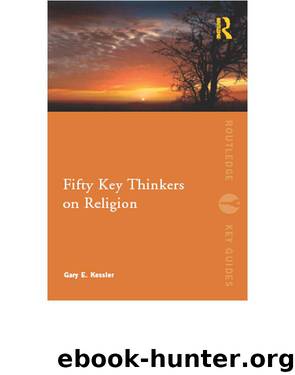Fifty Key Thinkers on Religion by Gary E. Kessler

Author:Gary E. Kessler
Language: nld
Format: epub
Publisher: Routledge
LUDWIG WITTGENSTEIN (1889–1951)
It strikes me that a religious belief could only be something like a passionate commitment to a system of reference.
(Wittgenstein 1980: 64)
In his typically cryptic style, Ludwig Wittgenstein, one of most influential philosophers of the twentieth century, states something profound with deep implications for understanding religion. But his remark is obscure. What is a “system of reference”? Why is religious belief “something like a passionate commitment” to such a system? Why could it “only be” that? The story behind this remark is complex, with many twists and turns and at least one about-face.
Ludwig Josef Johann Wittgenstein was born in Vienna, the youngest of eight children whose father had organized the first Austrian steel industry and whose grandfather had converted from Judaism to Roman Catholicism. He was educated at home until the age of fourteen, then embarked on a study of engineering. In 1908 he went to England and entered the University of Manchester but while there his interests shifted from engineering to mathematics. After reading Bertrand Russell’s work on logic, he decided to study logic with Russell, entering Trinity College, Cambridge in 1912.
Wittgenstein could be very charming, but he was often moody and depressed, even, at times, entertaining thoughts of suicide. In 1913 he moved to Norway and lived in seclusion in order to focus his tormented mind on logical problems. During World War I he volunteered for the Austrian Army and served with distinction in an artillery unit. He kept philosophical notebooks that became the basis for the Tractatus Logico-Philosophicus (1922), the first of his major publications. After the war he became a teacher at a small village school.
He gave up schoolteaching in 1926 and moved to Vienna, where he came in contact with the famous Vienna Circle of philosophers led by Moritz Schlick. The Vienna Circle is famous for developing logical positivism, which centered on the verification theory of meaning. This theory claimed that only those statements that scientific methods could “in principle” verify yield knowledge about reality. Metaphysical claims, including religious statements about unverifiable entities, although grammatically correct, were nonetheless meaningless. Wittgenstein is often associated with this theory, but he did not endorse it.
In 1937 Wittgenstein returned to Cambridge, submitted the Tractatus for his PhD thesis, and received a research appointment at the university. He assumed the prestigious G. E. Moore Chair in Philosophy in 1945 but found the life of a professional philosopher too artificial for his taste. He resigned his position, lived for a time in Ireland, was diagnosed with cancer and spent the last two years of his life staying with friends in Oxford.
There are only two published works of Wittgenstein that deal directly with religious matters: Lectures on Religious Belief (1966) and Remarks on Frazer’s “Golden Bough” (1979). Nevertheless, the impact of his ideas on the philosophy of religion were revolutionary. He was primarily concerned with the nature of language, which, he thought, is of fundamental importance because it is through language that human life and the world become comprehensible. Although
Download
This site does not store any files on its server. We only index and link to content provided by other sites. Please contact the content providers to delete copyright contents if any and email us, we'll remove relevant links or contents immediately.
Waking Up in Heaven: A True Story of Brokenness, Heaven, and Life Again by McVea Crystal & Tresniowski Alex(37812)
Empire of the Sikhs by Patwant Singh(23086)
We're Going to Need More Wine by Gabrielle Union(19046)
Hans Sturm: A Soldier's Odyssey on the Eastern Front by Gordon Williamson(18592)
Leonardo da Vinci by Walter Isaacson(13336)
The Radium Girls by Kate Moore(12028)
Tools of Titans by Timothy Ferriss(8396)
Educated by Tara Westover(8054)
How to Be a Bawse: A Guide to Conquering Life by Lilly Singh(7486)
Permanent Record by Edward Snowden(5847)
The Last Black Unicorn by Tiffany Haddish(5636)
The Rise and Fall of Senator Joe McCarthy by James Cross Giblin(5280)
Promise Me, Dad by Joe Biden(5154)
The Wind in My Hair by Masih Alinejad(5095)
A Higher Loyalty: Truth, Lies, and Leadership by James Comey(4964)
The Crown by Robert Lacey(4817)
The Iron Duke by The Iron Duke(4356)
Joan of Arc by Mary Gordon(4112)
Stalin by Stephen Kotkin(3968)
